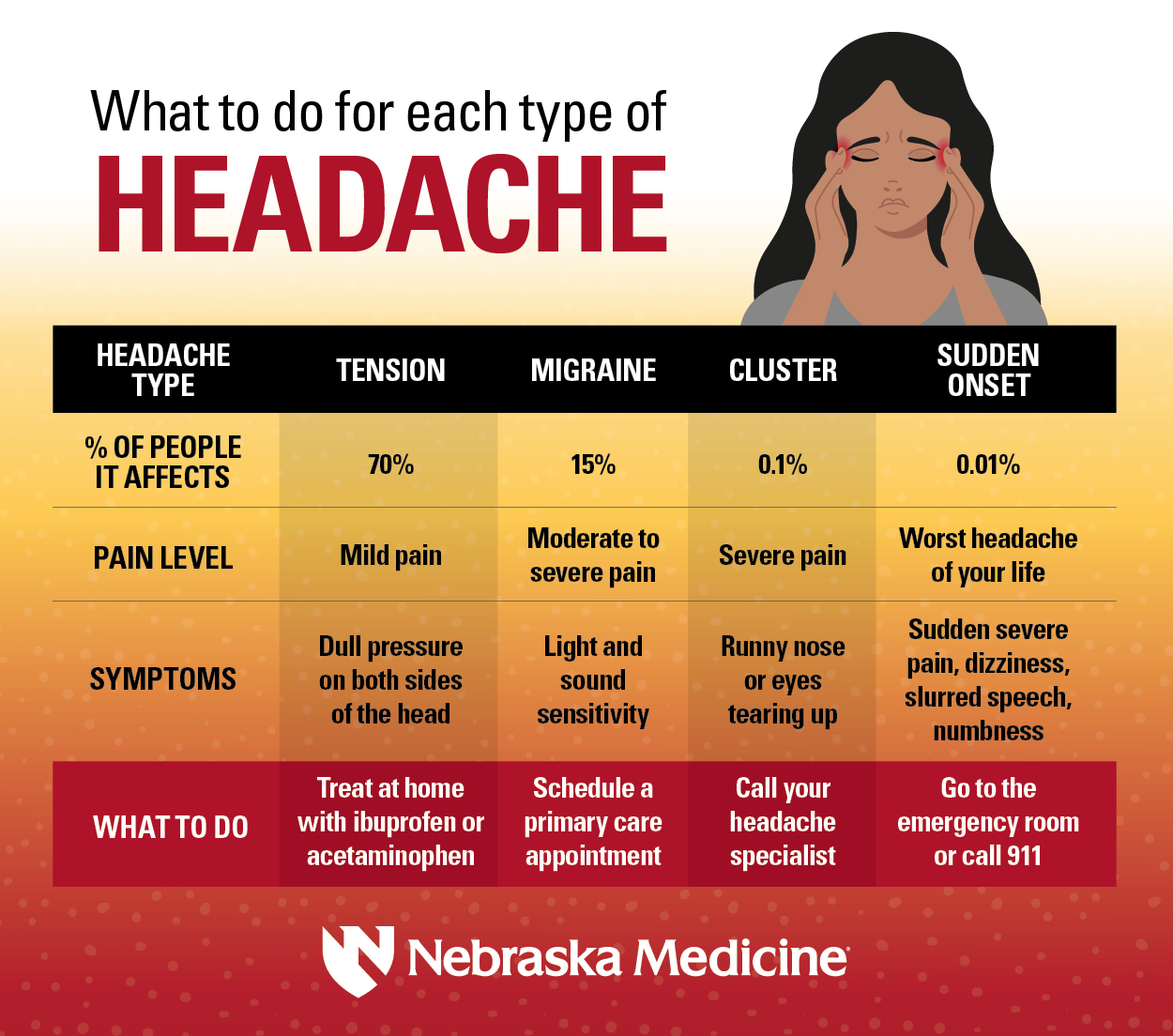
Some headaches can be managed at home. And other types of headaches require prescription-strength help to calm them down. You may not realize that chronic headaches are definitely treatable. "As a neurologist, I was attracted to treating migraines because of the difference I can make," says neurologist Elizabeth Hartman, MD. "We can help our patients function so much better."
"I love treating migraines because it substantially changes people's lives," agrees pain medicine specialist Angie Rakes, MD. Dr. Rakes and Dr. Hartman help patients suffering from headaches get better sleep, work more effectively and live life to the fullest.
In this article, find out if the type of headache you're experiencing is a treat-at-home kind or a trip-to-the-doctor kind.
Tension headache
- Affects 70% of people
- Mild pain
- Symptoms: Dull pressure on both sides of your head
- What to do: Treat at home with ibuprofen or acetaminophen
Tension headaches are the run of the mill, average headaches. You can treat these at home without a problem. "Tension headaches might be annoying or bothersome, but they're very rarely disabling," says Dr. Hartman. They feel like a dull pressure on both sides of your head. You can treat tension headaches with over-the-counter medicines like ibuprofen or acetaminophen.
Migraine headache
- Affects 15% of people
- Moderate to severe pain
- Symptoms: Light and sound sensitivity
- What to do: Call 800.922.0000 to schedule a primary care appointment
Migraines are more severe. "Migraines tend to feel like throbbing. It tends to be one side, but it could be both sides," says Dr. Rakes. Women make up 75% of migraine sufferers.
People with migraines often lay in bed in a dark room, unable to function since they're so bad. "Unlike a regular headache, people can't push through and function through migraine headaches," says Dr. Hartman. "But the good news is that we have a lot of treatments for migraine headaches."
Some common triggers that make migraines worse:
- Not sleeping well: Poor sleeping habits or sleep deprivation
- Foods: Alcohol like red wine, preservatives like MSG and foods with high salt content like hot dogs or deli meat
- Prior injuries: Whiplash, concussion or other injuries
Cluster headache
- Affects 0.1% of people
- Severe pain
- Symptoms: Runny nose or eyes tearing up
- What to do: Call 800.922.0000 to schedule an appointment with a headache specialist
Another type of headaches is called cluster headaches, which are named because they come at a certain time of the year. So someone may experience cluster headaches every spring, for instance, and then the rest of the year, they have no trouble at all. Cluster headaches can last from 15 minutes to three hours.
Cluster headaches are more common in men than women. "People have told me that they'd rather hit their head against a wall to feel that pain rather than feel a cluster headache," says Dr. Rakes.
Like migraines, there are treatments available for cluster headaches. Your doctor may prescribe oral medications or an injectable.
Sudden onset headache
- Affects less than 0.01% of people
- Worst headache of your life
- Symptoms: Sudden severe pain, dizziness, slurred speech, numbness
- What to do: Go to the emergency room or call 911
Dizziness, slurred speech, numbness, vomiting and weakness are all signs of a sudden onset headache. Also called a thunderclap headache, a sudden onset headache is dangerous. You might have hit your head or have a brain bleed.
"A severe onset headache feels different from past headaches you've had. It feels unlike anything you've ever experienced before," says Dr. Rakes. "Go immediately to the emergency room if you're experiencing this type of headache."
When it's time to see a doctor
If your headaches are affecting your quality of life, talk to a doctor. "Even though migraines can be disabling, they're very treatable. We can help the vast majority of people," says Dr. Hartman.
It's best to talk to your primary care doctor first. They may prescribe you medication or refer you to a pain medicine doctor or neurologist if your situation requires a specialist.
A helpful tip for your appointment is to keep a headache diary. Keep track of when you're having headaches and what seems to bring them on. For example, some people get headaches right as the weather changes due to barometric pressure changes.

